|
|
Post by Phil Maurice on Apr 23, 2019 7:09:10 GMT -5
Walking Distance - Season One Episode Five. Writer - Rod Serling. Director - Robert Stevens. Starring - Gig Young, Ronnie Howard, Frank Overton. This is my favorite episode of the series. Its themes of nostalgia and the loss of innocence resonated powerfully with Serling and he would return to them several times throughout the series' run. The punishing pressure that Serling felt as a writer trying simultaneously to satisfy the network, sponsors, the audience and his own creative standards had been previously addressed in The Velvet Alley for Playhouse 90. There, Art Carney's character, a writer, laments that "they pay you sixteen hundred dollars a week, and they keep paying you sixteen hundred dollars a week until that's what you need to live on." I would also mention the marvelous music composed especially for this episode by Bernard Herrmann. It really elevates the proceedings to levels more cinematic than the usual late-50s TV fare. Gig Young was a terrific actor, but evidently a very troubled man. He would go on to win an Oscar in 1969, lose the role of The Waco Kid in Blazing Saddles due to his alcoholism, and finally commit suicide after murdering his wife of three weeks. |
|
|
|
Post by dbutler69 on Apr 24, 2019 8:26:12 GMT -5
I agree that "The Sixteen-Millimeter Shrine" was meh, and I did like "Walking Distance". That one is a bit personal to me as I am all wrapped up in nostalgia myself and do wish I could "go home again" though I fully realize that I can't. I also agree that Martin Sloan makes some really bad decisions.
|
|
|
|
Post by Slam_Bradley on Apr 27, 2019 20:52:41 GMT -5
Walking Distance - Season One Episode Five. Writer - Rod Serling. Director - Robert Stevens. Starring - Gig Young, Ronnie Howard, Frank Overton. Gig Young was a terrific actor, but evidently a very troubled man. He would go on to win an Oscar in 1969, lose the role of The Waco Kid in Blazing Saddles due to his alcoholism, and finally commit suicide after murdering his wife of three weeks. That was not terribly long after he won the Best Supporting Actor Oscar as the Emcee in They Shoot Horses Don't They. Great film based on a really great book. Sad end to a talented but troubled man. |
|
|
|
Post by Slam_Bradley on Apr 27, 2019 21:28:16 GMT -5
Escape Clause - Season 1 Episode 6. Writer: Rod Serling. Director: Mitchell Liesen. Starring: David Wayne and Thomas Gomez.  Opening Narration Opening Narration: "You're about to meet a hypochondriac. Witness Mr. Walter Bedeker age forty-four. Afraid of the following: death, disease, other people, germs, draft, and everything else. He has one interest in life and that's Walter Bedeker. One preoccupation, the life and well-being of Walter Bedeker. One abiding concern about society, that if Walter Bedeker should die how will it survive without him?"  Synopsis Synopsis: Walter Bedker is a hypochondriac. He's also a narcissist. And a thoroughly unlikable person. We first meet him as he is "sick" in bed being seen to by the doctor with is wife standing by. There's nothing wrong with, according to the Doc. All in his head. But Walter knows best. After berating his wife and bemoaning the shortness of man's life a gentleman appears at his bedside. It's a small matter. His soul for near immortality. Walter can have another thousand years or more for that small price. And there's an escape clause...just in case Walter's immortality becomes a burden. Of course Walter isn't the type to put this boon to good use. He's a small petty man and in the end he has to use the clause quite quickly to escape a fate worse than death. 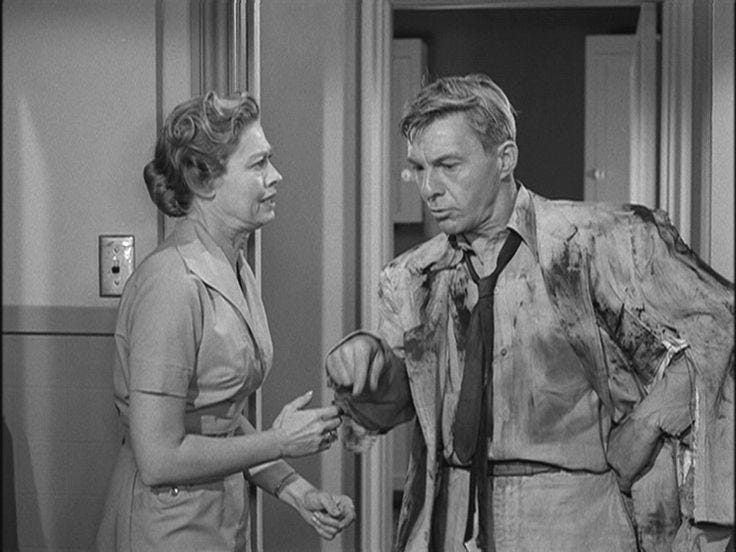 Thoughts Thoughts: The deal with the Devil is nothing new. Nor is the danger of immortality. I will say that Bedeker invokes the escape clause a bit too easily for my taste. I ponder if this is a failing on Serling's part or if it's planned that Bedeker isn't a deep thinker. For while his ultimate fate would have been awful he was immortal. He had plenty of time to try to avoid that fate and being immortal he probably could have. This is the first episode where we actively root for the main character to get his comeuppance. And he does. I find this to be a weak episode. Not that there's anything intrinsically wrong with it...but it pales in comparison to the rest of season one.  Trivia Trivia: Contains small roles for two actors best known for long-running TV commercials, Virginia Christine (Mrs. Olson for Folgers Coffee) and Dick Wilson (Mr. Whipple for Charmin Bathroom Tissue).
|
|
|
|
Post by Phil Maurice on Apr 28, 2019 13:06:52 GMT -5
Escape Clause - Season 1 Episode 6. Writer: Rod Serling. Director: Mitchell Liesen. Starring: David Wayne and Thomas Gomez. This is the first episode where we actively root for the main character to get his comeuppance. And he does. I find this to be a weak episode. Not that there's anything intrinsically wrong with it...but it pales in comparison to the rest of season one. Enjoying your write-ups, Slam. I agree the execution is inelegant, but I admire the "message" of the episode. A show of mercy by the State ultimately undoes the villain's plans. This is in keeping with Serling's philosophy. It also seems to have the opinion that life imprisonment is a superior solution to the death penalty. Really minor, bordering on irrelevant trivia: David Wayne would play the Mad Hatter (brilliantly) on the '66 Batman series. |
|
|
|
Post by Slam_Bradley on May 12, 2019 12:47:52 GMT -5
The Lonely, Season 1, Episode 7. Written by Rod Serling. Directed by Jack Smight. Starring Jack Warden, John Dehner, Jean Marsh.  Opening Narration Opening Narration: "Witness if you will, a dungeon, made out of mountains, salt flats, and sand that stretch to infinity. The dungeon has an inmate: James A. Corry. And this is his residence: a metal shack. An old touring car that squats in the sun and goes nowhere—for there is nowhere to go. For the record, let it be known that James A. Corry is a convicted criminal placed in solitary confinement. Confinement in this case stretches as far as the eye can see, because this particular dungeon is on an asteroid nine million miles from the Earth. Now witness, if you will, a man's mind and body shriveling in the sun, a man dying of loneliness." 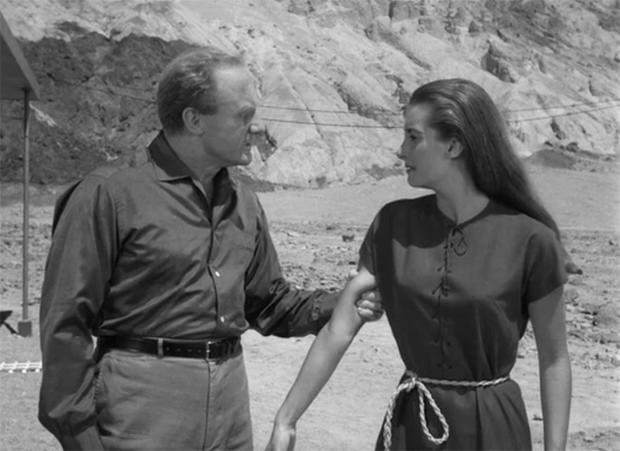 Synopsis Synopsis: Corry (Warden) is the sole inmate on an asteroid prison. A spaceship brings supplies four times per year and the Captain (Dehner) clearly feels that the punishment is inhuman. As such he brings along an unauthorized item for Corry, a female humaniform robot. At first Corry is appalled. But as they interact the robot, Alicia (Marsh) becomes increasingly human and important to him. Of course when Corry's sentence is overturned that causes problems.  Thoughts and trivia Thoughts and trivia: The Twilight Zone again looks at issues of loneliness and what it means to humans. Warden is excellent in the role of Corry. We also get to see an early appearance (uncredited) of Ted Knight as one of the spaceship crew (and a very unpleasant one at that). This is one of the more overtly SF episodes, though you have to take the science with more than a few grains of salt (no way it is big enough to have an atmosphere, even if any asteroids had atmospheres). Not the best episode ever, but the type of good solid episode on which the show built its considerable reputation.
|
|
|
|
Post by berkley on May 13, 2019 0:15:48 GMT -5
I may have this confused, but I think I read somewhere that Serling was critical of Walking Distance - forget the details now, but there was some plot point he thought didn't make sense. I agree with everyone else, though, that it's a classic episode. Was the name of the town Willoughby, or am I mixing it up with a different TZ episode?
A friend of mine told me last year that he had recently tried to get his wife to watch this first season of the Twilight Zone with him. Not a science fiction or genre fan in general, she had never seen the series, amazingly, and knew little about it. Anyway, that very first episode was too intense (her words) for her and she declined continuing, so my friend had to carry on by himself. I thought that was pretty impressive testimony to the power of a 60-year-old tv series, that it could still have such an effect on an unprepared viewer.
|
|
|
|
Post by badwolf on May 13, 2019 9:11:20 GMT -5
I may have this confused, but I think I read somewhere that Serling was critical of Walking Distance - forget the details now, but there was some plot point he thought didn't make sense. I agree with everyone else, though, that it's a classic episode. Was the name of the town Willoughby, or am I mixing it up with a different TZ episode? That's "A Stop at Willoughby." |
|
|
|
Post by Slam_Bradley on May 13, 2019 9:26:21 GMT -5
I may have this confused, but I think I read somewhere that Serling was critical of Walking Distance - forget the details now, but there was some plot point he thought didn't make sense. I agree with everyone else, though, that it's a classic episode. Was the name of the town Willoughby, or am I mixing it up with a different TZ episode? My understanding, from what I've read, is that Walking Distance was Serling's most personal writing based on his childhood hometown and experiences. I've not seen anything to indicate he was upset with the episode. |
|
|
|
Post by badwolf on May 13, 2019 18:11:54 GMT -5
I may have this confused, but I think I read somewhere that Serling was critical of Walking Distance - forget the details now, but there was some plot point he thought didn't make sense. I agree with everyone else, though, that it's a classic episode. Was the name of the town Willoughby, or am I mixing it up with a different TZ episode? My understanding, from what I've read, is that Walking Distance was Serling's most personal writing based on his childhood hometown and experiences. I've not seen anything to indicate he was upset with the episode. There's nothing like that in Marc Zicree's companion book, either. Producer Buck Houghton thought it was one of the best episodes the show produced. The network VP was skeptical of the script at first, thought it was too fantastical and that the public wouldn't buy it, but after meetings he eventually came round. |
|
|
|
Post by rom on May 14, 2019 13:33:28 GMT -5
Great thread. In reading these posts/descriptions of the episodes, I'm getting a greater appreciation of the Original TZ series. I made a point of watching every episode (in chronological order) back in Spring/early Summer 2012. Since it's been a while, I may consider going back & re-watching this whole series again. It's definitely iconic.
|
|
|
|
Post by berkley on May 16, 2019 23:17:23 GMT -5
My understanding, from what I've read, is that Walking Distance was Serling's most personal writing based on his childhood hometown and experiences. I've not seen anything to indicate he was upset with the episode. There's nothing like that in Marc Zicree's companion book, either. Producer Buck Houghton thought it was one of the best episodes the show produced. The network VP was skeptical of the script at first, thought it was too fantastical and that the public wouldn't buy it, but after meetings he eventually came round. I'm probably getting it mixed up with another episode or just completely misremembering the whole thing. I think I have half an idea where I might have read or heard whatever it is I was thinking of so I'll see if I can find it and clarify. |
|
|
|
Post by Slam_Bradley on Jun 1, 2019 11:16:40 GMT -5
Time Enough at Last - Season 1, Episode 8. Written by Rod Serling. Directed by John Brahm. Starring Burgess Meredith, Vaughn Taylor, Jacqueline deWit  Opening Narration Opening Narration - "Witness Mr. Henry Bemis, a charter member in the fraternity of dreamers. A bookish little man whose passion is the printed page, but who is conspired against by a bank president and a wife and a world full of tongue-cluckers and the unrelenting hands of a clock. But in just a moment, Mr. Bemis will enter a world without bank presidents or wives or clocks or anything else. He'll have a world all to himself... without anyone." 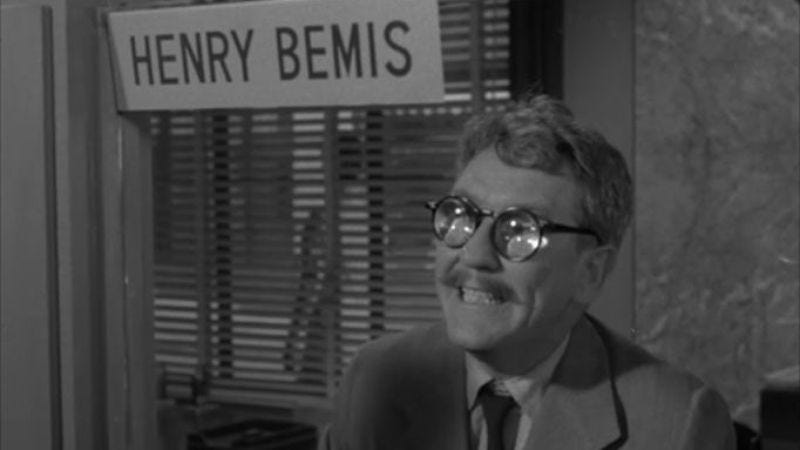 Synopsis Synopsis - Henry Bemis is a little man with a little job and very thick glasses. The only thing in life that seems to give him pleasure is reading...reading almost anything. Unfortunately everything seems to conspire against him being able to read. His wife hates his reading. He tries to read at work...with unsatisfactory results. One day Henry sneaks off at lunch into the bank vault where he's a teller to lose himself in a book. When he emerges from the vault he finds he'll have all the time he wants to read. Until the rug is pulled out from under him...in the Twilight Zone. 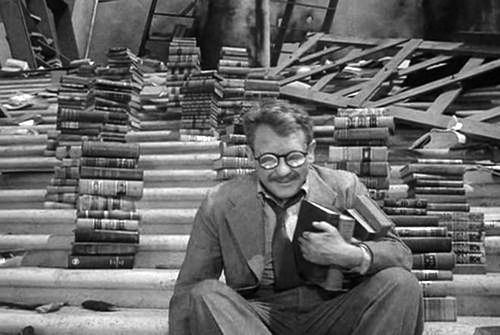 Thoughts and Trivia Thoughts and Trivia - This is probably my personal favorite episode of the series and is an acknowledged classic almost always appearing in the top five of any list of episodes. It was apparently also one of Serling's favorite episodes. It's also among the most parodied episodes having been spoofed by Futurama, Family Guy, The Simpsons comics, The Drew Carey Show and a number of others. I think that it certainly speaks to us book-worms who never could find enough time to read all the things we wanted to read. And Bemis' wife is a stand-in for any parent who told us to get our noses out of a book or anyone else who told us we were wasting our time reading. Bemis, however, is certainly not without fault. His reading at work interferes with his job and is certainly not fair to his employer or to the bank customers who aren't getting his full attention. And he doesn't stand up to his wife and assert his right to have time for himself. Bemis is an emotionally abused husband who needs to get out of that situation. The episode is a little bit science fiction with a healthy dose of fantasy. The manner in which Bemis gets his time doesn't make a huge amount of sense. And there are certainly work-arounds for his ultimate problem. But the story is fabulous and it hits home, especially for some of us. 
|
|
|
|
Post by wildfire2099 on Jun 2, 2019 20:52:58 GMT -5
This is one of the most memorable episodes to me, but I find it a little to sad to really appreciate... that poor guy! I've literally had nightmares about being in a similar situation.
|
|
|
|
Post by Slam_Bradley on Sept 18, 2021 18:57:24 GMT -5
Perchance to Dream - Season 1, Episode 9. Written by Charles Beaumont. Directed by Robert Florey. Starring Richard Conte, John Larch, Suzanne Lloyd. 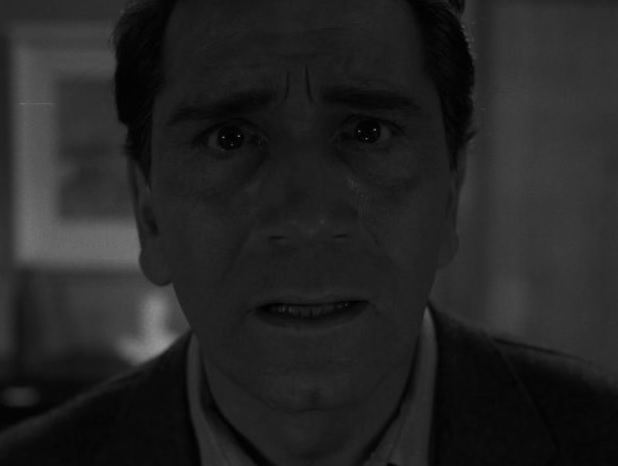 Opening Narration: Opening Narration: "Twelve o'clock noon. An ordinary scene, an ordinary city. Lunchtime for thousands of ordinary people. To most of them, this hour will be a rest, a pleasant break in a day's routine. To most, but not all. To Edward Hall, time is an enemy, and the hour to come is a matter of life and death." Synopsis: Edward Hall is a man with a severe heart condition. He hasn't been sleeping, keeping himself awake because he believes that if he sleeps he'll die. In addition to his heart condition, Hall has an overactive imagination. And he's been plagued by dreams of a serial nature, in which Maya, the cat girl, has lured him into a carnival funhouse and onto a roller coaster to put strain on his heart and kill him. He knows that the next dream will kill him...but so will the stress of not sleeping. Now he's gone to a psychiatrist's office seeking help. 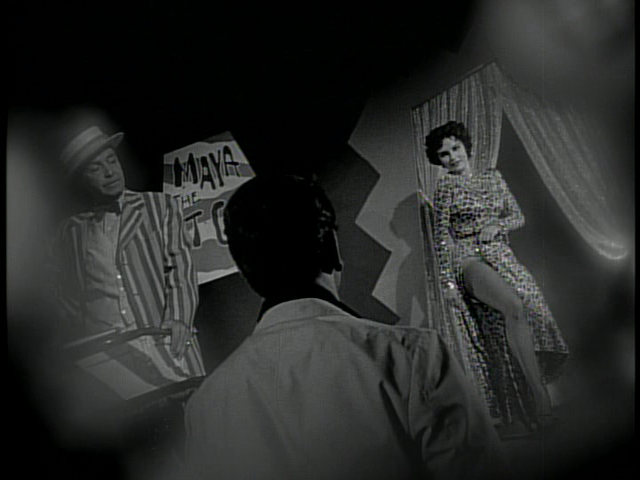 Thoughts: Thoughts: There's a very cinematic flare (including the use of Dutch angles) to the episode, particularly the carnival scenes (always a potentially creepy place). Conte is convincing as a man who is inches from the edge and Suzanne Lloyd as Maya is certainly bewitching enough to lure him over. There's honestly not a lot that can be said about the plot of the story without spoilers (the bane of a 30 minute show with a twist ending). This is a solid episode, but not a top tier classic. Trivia: The first episode written by Charles Beaumont and the first not written by Rod Serling. Based on a Beaumont short story that had originally appeared in Playboy. John Larch will return in episodes in Seasons two and three.
|
|